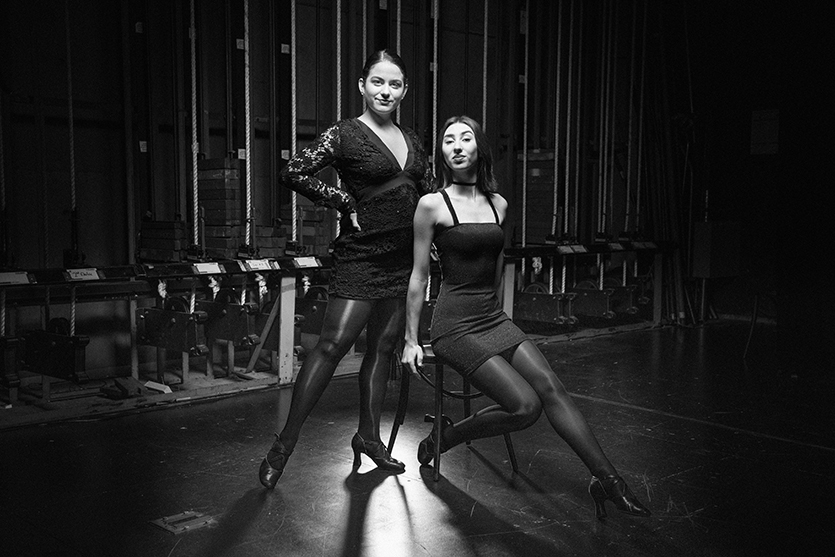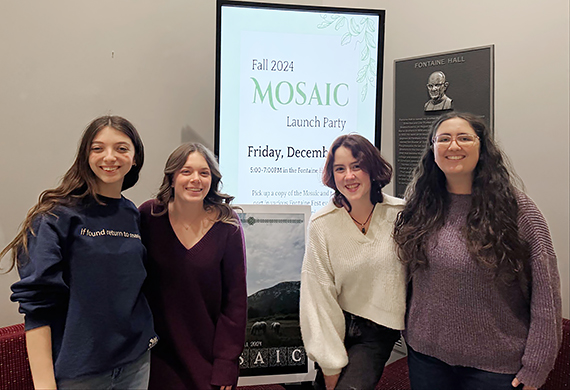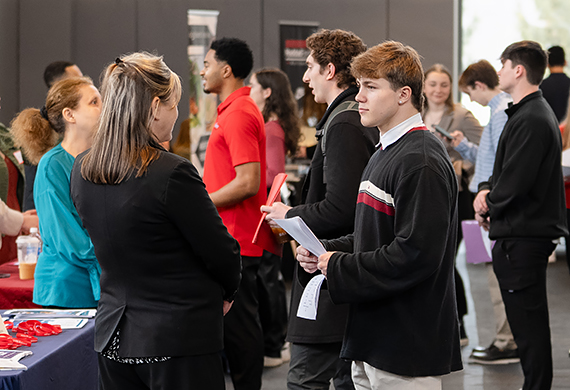Setting the Stage: Celebrating 60 Years of Marist Theatre

From Waiting for Godot in 1960 to the upcoming production of Chicago, theatre has a rich history at the College.
Can we get a spotlight center stage? The 60th anniversary season of Marist Theatre is here.
It started with a production of Waiting for Godot in 1960. Now, Marist Theatre is the comprehensive name for 60 years of Theatre Guild, Children’s Theatre, Experimental Theatre Guild, Marist College Club of Theatre Arts (MCCTA), and Theatre Program. With its rich traditions and focus on bridging the classroom to the stage, Marist Theatre brings approximately ten productions and special events to fruition each year, enhancing campus life—and providing key skill-building and leadership opportunities for students. This year’s spring mainstage show is Chicago, which will be performed February 21, 22, 28, and 29 at 8:00pm and February 22, 23, and March 1 at 2:00pm in the Nelly Goletti Theatre.*
From Club to Full-Fledged Academic Program
For its first four decades, Marist Theatre was largely an extra-curricular club activity run by faculty members Jeptha Lanning ’53 and Jerry Cox ‘55. In 2000, Matt Andrews was brought in as the first full-time professor for teaching theatre. With English professor Don Anderson, Andrews introduced several new theatre courses while building a Theatre minor that included more performance-based courses and the entire production process. In 2005, the first production was launched through academics, then known as the School of Liberal Arts (SLA) Theatre. That production, Godspell, created further student interest in academic-funded and faculty-directed and designed productions. A string of strong productions followed: The Laramie Project (fall 2005), Noises Off (spring 2006) and A Midsummer Night’s Dream (2006), a summer production outside in the Grotto. The 2007 production of Cabaret featured scenic design by Marist’s first full-time theatre history professor, Eileen Curley.
The next few years were marked by enormous growth. The Marist Theatre Program was launched as an academic program in 2007 and Andrews was appointed as its first administrative director. With the Office of Admission, the Theatre Scholarship Program, and the Summer Pre-College Theatre Program, were launched. Other innovations included a combined club and program production season with a professional design staff, as well as providing summer internships with Marist’s new professional summer theatre, River Valley Rep. Marist also hired its first scene shop supervisor, Jim Steinmeyer ’71. Today there are approximately 60-65 Theatre minors in a given year, plus more than 100 students participating in Marist Theatre productions. Over 5,000 members of the Marist community and beyond attend productions each academic year.
Professor Matt Andrews on the 2018 set of Anything Goes
Building Skills
“Our Theatre Program offers a dynamic curriculum that complements training for a variety of careers,” said Andrews. “Theatre students learn crucial skills like time management and meeting defined deadlines under pressure, for example, as well as specific modes of collaboration and creative problem solving. They train to be both team members and team leaders through project management and event planning positions. The arts administration skills our students learn are vital to the varied careers they pursue. For many Marist students, this program allows them to follow a passion while pursuing career goals, and there is a concrete value in that for Marist, I believe.”
Andrews points out that goal of the minor in theatre is not to prepare students for careers in theatre, but more so to apply their craft and soft skills to a variety of professional opportunities. “Any student can benefit from a minor in theatre, but Communication, Media Studies, Business and Liberal Arts majors are the bulk of our Theatre minors. It’s typical for a student with a theatre minor to have two majors, or a second minor. Most have completed internships as well. When they graduate they are immediately employable in ad agencies, marketing firms and media production companies, for example.”
Mena Buscetto ’17, an account executive at the public relations firm Finn Partners, concurred. “The Marist Theatre Program was an extremely formative experience that shaped me into the employee, leader, and independent adult that I am today. Looking back on my four years as a Marist student, I can think of no experience more rewarding and beneficial than being part of the Theatre Program,” she said. “Throughout my time in the program, I participated, one way or another, in nearly every show. Whether it was performing, directing, managing props design or selling tickets at the box office, it became very clear to me that no role was too small in putting on a quality production.”
Harper Finch ’22 agreed. “I have learned a lot about leadership and teamwork in the Theatre Program,” she said. “Theatre is a very collaborative process: everyone needs to be invested and passionate about what they’re doing. Theatre has taught me more than how to play a character. It’s taught me how to understand other people and their situations, how to be compassionate, how to be a leader and how to be a friend. In a more academic way, I’ve learned lots of presentation and interview skills. But I think the interpersonal skills have had the strongest impact on me.”
This year’s spring mainstage musical is Chicago, the longest-running American musical in Broadway history. A cast of 19 students is supported by a professional thirteen-piece orchestra. The iconic show features choreography influenced by the legendary Bob Fosse and tells a satirical story of corruption set during the jazz age.
“This production is a great way to celebrate 60 years of theatre at Marist,” said Andrews. “When you see this show, you don’t just see all of the hard work of the 19 actors on-stage. You also see the collaborative teamwork of the technicians, backstage crews, and staff displayed through the actors. I wish Jep and Jerry could see us now, I know they would be proud.”
* Performance dates for Chicago span two weekends: February 21, 22, 28, and 29 at 8:00pm and February 22, 23, and March 1 at 2:00 in the Nelly Goletti Theatre. As always, Marist faculty and staff receive two complimentary tickets and advance reservations are highly recommended. Complimentary reservations for faculty and staff can be made by emailing boxofficemccta@gmail.com. Simply identify yourself as faculty/staff with date, time and number of tickets requested and you will receive a confirmation email. Additional tickets are $12 general admission and $6 students/seniors/military. Your tickets will be at the door 90 minutes before curtain and the house opens 30 minutes before curtain. Seating is general, first come-first seated. Chicago is recommended for ages 13 and older, and no children under 6 will be admitted.



